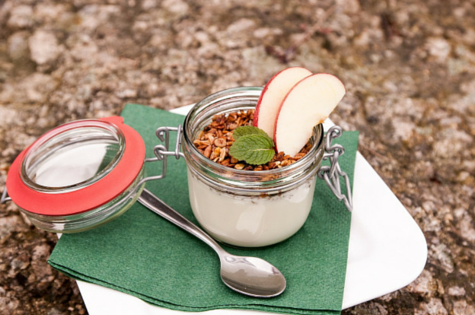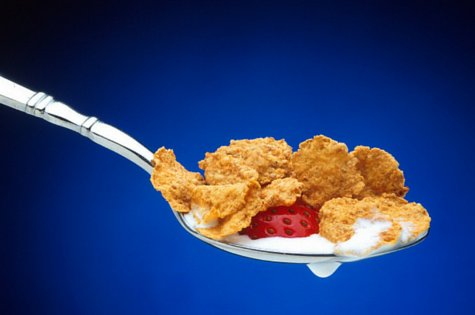

New Research: Parents Losing Breakfast Battle:Australian parents worry their children don’t eat enough breakfast
Date: July 16 2015

New research reveals more than 2.2 million (67%) Australian parents worry their children don’t eat enough breakfast to get them through a morning at primary school, while almost 200,000 parents send their children to primary school without breakfast most mornings1.
The new Galaxy Research, commissioned by the Australian Breakfast Cereal Manufacturers Forum (ABCMF), was conducted among parents of primary school children nationally and highlights the breakfast battles faced by families.
It shows two out of three parents (67%) resort to strategies including bribes and/or bans to get their children to eat breakfast before primary school. Among these parents, almost half (46%) agree that banning TV and access to technology is the most successful tactic.

Mother-of-two, dietitian and expert on taming fussy eaters Kate Di Prima said the figures were alarming.
“The primary school years are the most crucial for in establishing routines and healthy dietary habits, and while parents are desperately trying to do what’s right, they’re often pressed for time and completely confused as to what’s good for their children,” said Ms Di Prima.
“Switch off TV and limiting technology is a great start. It’s then about finding easy and nutrient-packed brekkie options your children to enjoy.”
The Galaxy research shows for most parents (72%) a bowl of cereal is the easiest option to get their children to eat on a school morning, followed by toast (67%) and fruit (23%).
“Parents need to know it’s ok to go for what’s quick and easy. The fact is children who regularly eat cereal are more likely to have better vitamin and mineral intakes and are less likely to be overweight or obese2,” said Ms Di Prima.
“And let them slurp the milk from the bowl too, as cereal accounts for almost a third of daily milk intake in Australian children3.”
Advanced Accredited Practising Dietitian and ABCMF Director Leigh Reeve said breakfast was essential to give children the energy and nutrient boost. “Children need most of their food and energy in the mornings to take on the day and meet the needs of their growing bodies,” said Ms Reeve.
“It also makes a big difference in the classroom. Scientific research shows eating breakfast helps children perform better at school in both mathematical and creative tasks4-8.
“In particular, a good quality breakfast containing at least one serve of cereal, dairy and fruit has been shown to positively influence school performance6.
“And this is backed up by what teachers experience. Many teachers see the impact of skipping breakfast on a daily basis reporting lack of concentration, lethargy, learning difficulties and behavioural problems among children not eating before school9.”
The Galaxy research shows two thirds (66%) of parents find it a challenge to get their children to eat breakfast before primary school and for more than a third (38%) it’s a weekly battle.
It reveals the main barrier faced by parents in getting their children to eat breakfast is lack of appetite or just children being fussy (50%).
Apart from restricting TV and technology to win the breakfast battle, parents who have tried different strategies have found success with making a favourite breakfast for their children as a treat (27%), praise and reward charts (20%), preparing brekkie to have on the way to school (17%), and setting alarms earlier (17%).

It also shows parents who skip breakfast are more likely to have children that skip breakfast too, reporting a 15 percentage point increase in skipping breakfast compared to the children of adults who don’t skip breakfast.
Dietitian Kate Di Prima’s Tips for Winning the Brekkie Battle
– Don’t turn on the TV or technology until breakfast is eaten and children are ready for school.
– Find out what your children enjoy for breakfast, so you don’t waste time preparing options they won’t eat.
– Take 15 minutes each night to prepare for the morning rush e.g. have cereal out and ready, prepare porridge so it just needs to be warmed, etc.
– Consider an option for breakfast on-the-go – e.g. My favourite is a “nibbler box” of dry breakfast cereal, sultanas, and fresh fruit.
– For kids with early sport make a smoothie with breakfast cereal, milk and other favourite fruits the night before, so it is ready to grab, shake and go in the morning. Or have a liquid breakfast product at the ready.
– If your children love a cooked breakfast, eggs really only take a few minutes. If this still seems too time consuming to tackle, try pre-packing lunch boxes the night before to add in some extra time to your mornings.
– Lead by example. Ensure you are taking time to have breakfast, it will give you the energy and patience you need to manage the morning rush and really does set the best example.
Note on research:
The Galaxy Research was conducted in May 2015 among a representative sample of 1000 Australian Parents with primary school children aged 5-12 years. This represents 3.2 million parents of primary school children nationally.
References:
1. Galaxy Research, May 2015, survey of n=1000 Australian parents of primary school children aged 5-12 years.
2. Williams PG. The Benefits of Breakfast Cereal Consumption: A Systematic Review of the Evidence Base. Advances in Nutrition 2014; 5: 636S-673S.
3. Fayet F, Ridges L, Sritharan N, Petocz P. Breakfast cereal consumption is associated with higher micronutrient and milk intake among Australian Children. Australasian Medical Journal 2011; 4(12):775.
4. O’Dea JA, Mugridge AC. Nutritional quality of breakfast and physical activity independently predict the literacy and numeracy scores of children after adjusting for socioeconomic status. Health Education Research 2012; 27:975-985.
5. Kleinman RE, et al. Diet, breakfast, and academic performance in children. Ann Nutr Metab 2002; 46 (suppl 1): 24-30.
6. Hoyland A, Dye L, Lawton CL. A systematic review of the effect of breakfast on the cognitive performance of children and adolescents. Nutrition Research Reviews 2009; 22: 220-243.
7. Wyon DP, Abrahamsson L, Jartelius M, Fletcher R. An experimental study of the effect of energy intake at breakfast on the test performance of 10-year old children in school. Int. J. Food Sc. Nutr 1997; 48: 5-12.
8. Pollitt E, Mathews R. Breakfast and cognition: an integrative summary. American Journal of Clinical Nutrition 1998; V67: 804S–13S.
9. Foodbank Hunger In The Classroom Report, Galaxy Research N=532 primary and secondary school teachers. http://www.foodbank.org.au/wp-content/uploads/2015/05/Foodbank-Hunger-in-the-Classroom-Report-May-2015.pdf ;
|
||||||||||||||||||||||||||||||